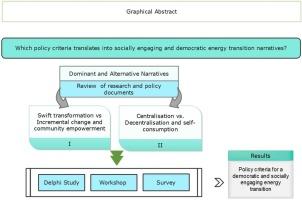民主和社会参与能源转型的叙事、期望和政策标准
IF 3.8
3区 管理学
Q1 ECONOMICS
引用次数: 0
摘要
能源转型政策可转化为关于能源系统应如何变化(如向集中或分散系统转变)的叙述。这些叙述往往反映了人们的期望、优先事项、对不同政策选择的可行性和社会可接受性的看法,以及长期目标和权衡,所有这些都会影响政策标准。本研究以葡萄牙及其执行欧洲指令的情况为案例,旨在描述能源转型叙事(如迅速向可再生能源转型)和相互关联的政策标准(如当地社区的参与)的特点,重点关注对社会参与和民主能源转型的期望。该分析以 10 位专家利益相关者参与的德尔菲调查、公民调查(人数=500)和 19 位参与者参与的研讨会的结果为基础。该分析确定了与利益相关者最相关的标准,以及影响能源系统未来叙述的不同基本期望、意义和态度的重要性。研究结果表明,与强调能源民主治理承诺的叙述相关的标准可能对能源转型政策不那么重要,因此会破坏能源民主的目标。结论强调了更有可能促进社会政治接受的政策和未来研究建议。本文章由计算机程序翻译,如有差异,请以英文原文为准。

Narratives, expectations, and policy criteria for a democratic and socially engaging energy transition
Energy transition policies can be translated into narratives about how energy systems should change (e.g., towards a centralised or decentralised system). These narratives tend to reflect expectations, priorities, and perceptions on feasibility and the social acceptability of different policy options, as well as long-term goals and trade-offs, all of which influence policy criteria. Taking as its case study Portugal and the implementation of European directives there, this study aims to characterise energy transition narratives (e.g. a swift transformation to renewables) and interrelated policy criteria (e.g., participation of local communities), focusing on expectations for a socially engaging and democratic energy transition. The analysis builds on the results of a Delphi survey with 10 expert stakeholders, a citizens’ survey (n=500), and a workshop with 19 participants. It identifies the most relevant criteria to stakeholders, as well as the importance of different underlying expectations, meanings, and attitudes shaping narratives about energy system futures. The findings indicate that criteria interrelated to narratives which highlight a promise of democratic energy governance may be less important for energy transition policies, and therefore undermine energy democracy goals. The conclusion highlights suggestions for policy and future research more likely to foster sociopolitical acceptance.
求助全文
通过发布文献求助,成功后即可免费获取论文全文。
去求助
来源期刊

Futures
Multiple-
CiteScore
6.00
自引率
10.00%
发文量
124
期刊介绍:
Futures is an international, refereed, multidisciplinary journal concerned with medium and long-term futures of cultures and societies, science and technology, economics and politics, environment and the planet and individuals and humanity. Covering methods and practices of futures studies, the journal seeks to examine possible and alternative futures of all human endeavours. Futures seeks to promote divergent and pluralistic visions, ideas and opinions about the future. The editors do not necessarily agree with the views expressed in the pages of Futures
 求助内容:
求助内容: 应助结果提醒方式:
应助结果提醒方式:


